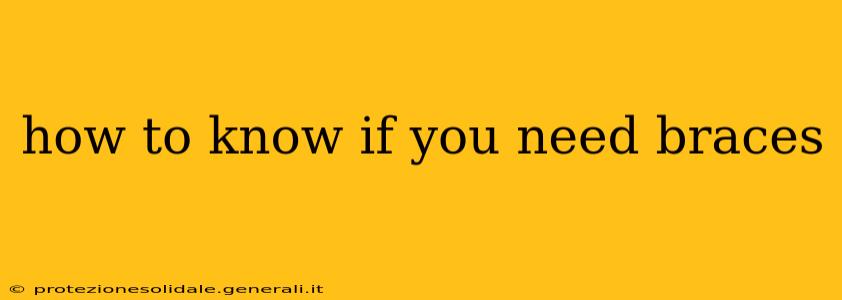Deciding whether or not you need braces can feel overwhelming. This comprehensive guide will help you understand the common signs and symptoms indicating a potential need for orthodontic treatment. We'll explore various factors considered by orthodontists and answer frequently asked questions to equip you with the knowledge to make an informed decision about your oral health.
What are the Signs You Might Need Braces?
Several factors suggest the need for orthodontic intervention. While some are easily noticeable, others require professional evaluation. Here are some key indicators:
- Crooked or Crowded Teeth: This is perhaps the most obvious sign. Overly crowded teeth can make cleaning difficult, leading to increased risk of cavities and gum disease.
- Overbite or Underbite: An overbite (upper teeth significantly overlapping lower teeth) or underbite (lower teeth projecting beyond upper teeth) can affect chewing, speech, and even jaw joint health.
- Crossbite: This occurs when some upper teeth bite inside the lower teeth instead of outside. It can lead to uneven jaw growth and facial asymmetry.
- Gaps Between Teeth (Diastema): While some find gaps aesthetically pleasing, large gaps can be problematic for biting and chewing, and prone to food trapping.
- Difficulty Chewing or Biting: If you struggle to bite or chew food properly, it could indicate a misalignment requiring orthodontic correction.
- Jaw Pain or TMJ Problems: Misaligned jaws can strain the temporomandibular joint (TMJ), leading to pain, clicking, or locking of the jaw.
- Speech Impediment: Severe misalignment can sometimes affect pronunciation and speech clarity.
- Gingivitis or Gum Disease: Crowded teeth make it difficult to clean thoroughly, leading to a higher risk of gum disease.
How Can I Tell if My Child Needs Braces?
Identifying the need for braces in children often involves early intervention. Here are some crucial considerations:
- Early Loss of Baby Teeth: Premature loss of baby teeth can affect the alignment of permanent teeth.
- Difficulty with Speech: As mentioned earlier, speech impediments can be related to teeth misalignment.
- Thumb Sucking or Pacifier Use (Past Age 4): Prolonged habits can significantly impact jaw and tooth development.
- Protruding or Receding Teeth: These conditions can be detrimental to both aesthetics and oral health.
When Should I Take My Child to an Orthodontist?
The American Association of Orthodontists recommends a first orthodontic visit around age 7. This early assessment allows for early intervention if needed, potentially preventing more complex and extensive treatment later.
What Happens During an Orthodontic Consultation?
During your consultation, the orthodontist will perform a thorough examination, including:
- Visual Inspection: Assessing the alignment of your teeth and jaws.
- X-rays: Evaluating the roots of your teeth and jawbone development.
- Dental Models: Creating molds of your teeth for detailed analysis.
- Photographs: Documenting the current state of your teeth and jaws.
Based on this comprehensive evaluation, the orthodontist will determine whether braces are necessary and discuss various treatment options.
Do I Need Braces if I Only Have One Crooked Tooth?
Even a single crooked tooth can disrupt the overall alignment and bite. An orthodontist can assess if it's worth correcting through braces or other methods.
Are There Alternatives to Braces?
Yes, several alternatives to traditional braces exist, including Invisalign (clear aligners) and other appliances. The best option will depend on your individual needs and the severity of the misalignment. Your orthodontist will discuss suitable options during your consultation.
How Much Do Braces Cost?
The cost of braces varies significantly depending on several factors, including the complexity of treatment, the type of braces, and your location. It's best to consult with an orthodontist for an accurate cost estimate.
This guide offers a comprehensive overview of determining whether you need braces. Remember, a professional evaluation from an orthodontist is crucial for a definitive diagnosis and treatment plan. Don't hesitate to schedule a consultation to address any concerns about your oral health.
